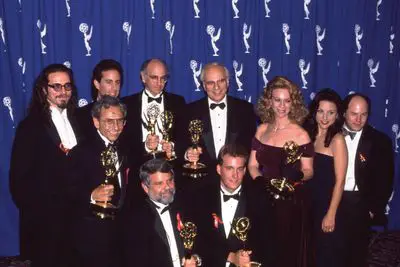Could Someone Please Reassess "Seinfeld" by Woke Standards? I Need to Know If I'm Allowed to Enjoy It
Everything I've ever loved from a bygone era needs to be re-analyzed through a modern lens to determine whether or not it is currently woke, Seinfeld included.
It's undeniable that Seinfeld was the quintessential '90s show, perfectly representative of an era before PC culture and 9/11, back when you could call a guy a Nazi for not giving you soup without worrying that anyone would actually think you were calling him a real Nazi.
I spent countless evenings watching "The Puffy Shirt" (that episode always seemed to be playing for some reason), and I cracked up every time that kooky guy with weird hair burst in yelling, "Hey Jerry!" But that was 20 years ago. I'm an adult now. And just like adult me realizes that my head won't actually turn into a deformed banana when I eat Gushers, adult me also believes that everything I've ever loved from a bygone era needs to be re-analyzed through a modern lens to determine whether or not it is currently woke. Since Seinfeld is coming to Netflix in 2021, now seems like a perfect time for someone to really reassess Seinfeld by modern standards.
If someone were to reassess Seinfeld by modern standards, there are a few burning questions that I'd really like to see explored. For example, the core Seinfeld group is composed of three men and one woman. Isn't that sexist? Wouldn't their friend group be more equally balanced if two of them were women? I'm not entirely sure, but that's something I'd really like to read an Internet writer's take on.
Also, if I remember correctly, all four of them are Jewish, which doesn't seem particularly diverse to me, but I'm also not sure if that's an appropriate thing to say about a minority group. If Seinfeld came out today, at least one of them would probably be non-white, but I'll leave the discussion of the details up to the writer who one day will hopefully tackle this important subject matter.
Another thought: I always found Newman very funny, but I worry that part of the humor was derived from his portly appearance. I'm not sure if it's kosher to laugh at physical comedy nowadays, especially when it comes at the expense of an actor who may not have realized that audiences thought he looked silly. Was Seinfeld intending to fat-shame Newman? That would be very uncool in a modern context considering our current body positivity culture. On the other hand, maybe Newman was supposed to be representative of Americans embracing their bodies even when they don't conform to unrealistic body standards, in which case Seinfeld might have been ahead of the curve. I really have no idea, so perhaps someone else could better inform me on whether or not it's still okay to laugh at Newman.
Unfortunately, even if it is still okay to enjoy the physical comedy of Seinfeld, navigating the narrative might be a real minefield. For instance, many of George's plotlines revolve around his relationships with women. In many of those relationships, George behaves badly, to say the least. Some of his behavior might even be considered manipulative or gaslighting. It's been a while since I watched, so I don't have any specific examples, but I'd love to see someone really lay into George because I have a feeling that in a modern light, people might view his behavior as somewhat toxic. I hate to say it, but I don't think George Costanza was a very good role model for kids. Maybe we need to #MeToo him?
Actually, now that I'm thinking about it, all of the main characters in Seinfeld were kind of bad people. All four of them were selfish and not particularly nice to one another or the people around them. From what I can remember, every episode revolves around the characters getting into some sort of conflict that was usually their own fault. Is that the kind of television show that modern audiences would be interested in watching––one starring characters of dubious morality? I'm not so sure.
Even worse, it looks like the kooky hair guy was played by Michael Richards, a comedian who went on a racist tirade in 2006. That racist tirade definitely would not hold up nowadays. In fact, I'm fairly certain that if Michael Richards said those things now, he would be canceled on Twitter. This new information presents an important ethical dilemma for modern day viewers: Can we still enjoy Seinfeld now, even though one of the actors said something very offensive 13 years ago? Certainly, this is a unique problem of our modern times that no humans have ever encountered or addressed prior. I'm positive that if anyone were to write a piece really exploring that question, it would be a real watershed moment in media criticism.
Furthermore, is it even possible to enjoy a TV show from yesteryear when the potential exists for someone somewhere on the Internet to re-analyze it later? What if we enjoy it now, but then a few years down the line (when social mores have changed even further), someone writes a think piece that puts everything in an entirely new perspective? Scarier, what if we read their take on the subject, and then still enjoy the show regardless? Is that okay? Are we allowed to apply nuance to the shows we like and understand that media, especially comedy, doesn't exist in a vacuum and that multiple perspectives can be equally valid at the same time? Or perhaps, we should just cancel ourselves upfront?
I don't know the answer, but I hope someone writes an article about it soon.
